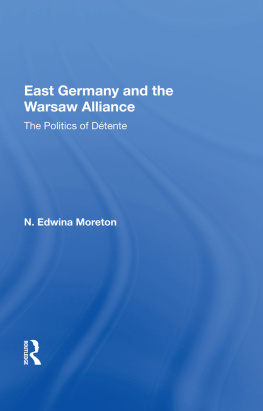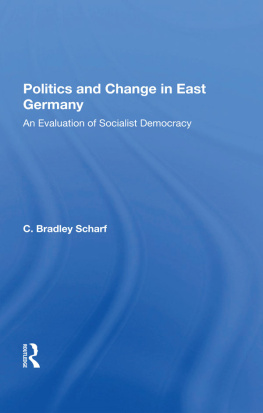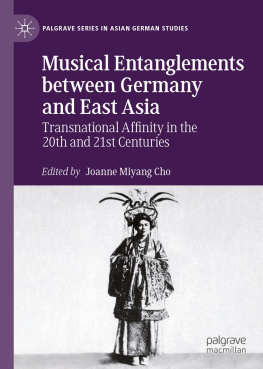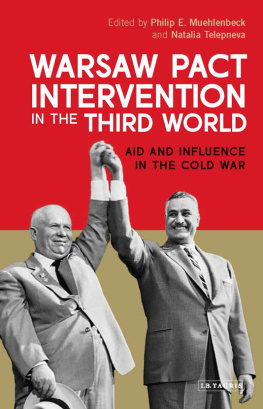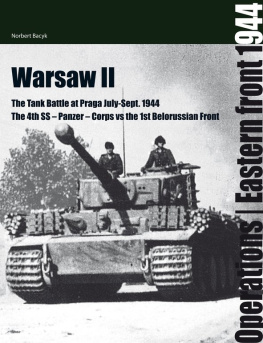East Germany and the Warsaw Alliance: The Politics of Dtente
First published 1978 by Westview Press
Published 2018 by Routledge
52 Vanderbilt Avenue, New York, NY 10017
2 Park Square, Milton Park, Abingdon, Oxon OX14 4RN
Routledge is an imprint of the Taylor & Francis Group, an informa business
Copyright 1978 by Taylor & Francis
All rights reserved. No part of this book may be reprinted or reproduced or utilised in any form or by any electronic, mechanical, or other means, now known or hereafter invented, including photocopying and recording, or in any information storage or retrieval system, without permission in writing from the publishers.
Notice:
Product or corporate names may be trademarks or registered trademarks, and are used only for identification and explanation without intent to infringe.
Library of Congress Cataloging card Number: 7819633
ISBN: 0-89158-265-7
ISBN 13: 978-0-367-01789-7 (hbk)
To Em OConnor
1 Numbers of persons leaving East Germany for West Germany
2 A comparison of the government declaration of the Grand Coalition, 13 December 1966 with that of the Small Coalition, 28 October 1969
3 Warsaw Pact Defense Expenditures, 197677.
4 Intra-German trade as a proportion of West Germanys trade with the Warsaw Pact states (including Albania)
5 Intra-German trade as a proportion of East Germanys trade with the Warsaw Pact states (including Albania)
First and foremost, I would like to acknowledge a special debt to two friends and colleagues, Michele OConnor and Ronnie Kowalski. Their encouragement, interest, and support over several years and on both sides of the Atlantic has seen this manuscript through its several stages and its author through many an inevitable rough patch.
The original manuscript which forms the basis of this book first saw the light of day as a doctoral thesis submitted to the Institute of Soviet and East European Studies at the University of Glasgow, Scotland. I am greatly indebted to my advisor at the Institute, Dr. Hannes Adomeit, for his guidance during preparation of the thesis and for his advice and encouragement since.
I am especially grateful, too, to the Commonwealth Fund of New York for giving me the opportunity to spend twenty-one months in the United States as a Harkness Fellow, thereby affording me the necessary distance - both in space and time - from which to reappraise my work, renew my energies, and among other things produce this book.
The Center for International Studies at M.I.T. has provided me with a stimulating and congenial environment. I am grateful to its Director, Professor Eugene B. Skolnikoff, for extending to me the hospitality of the Center for the past two years, and to its Administrative Officer, Kathleen T. OSullivan, both for smoothing my path when I first arrived and for all her help since.
I would particularly like to thank the following persons for their helpful advice, comments, and criticisms: Professor William E. Griffith of M.I.T., Professor Henry Krisch of the University of Connecticut, Wolfgang Pordzik, a colleague at the Center, Professor Robin Remington of the University of Missouri, and Professor Angela Stent Yergin of the Russian Research Center, Harvard, and Holy Cross. My perspective on the subject was enhanced by informal discussions in October 1977 with several diplomats and government representatives, past and present, in Washington, D.C. I thank them for their time and interest.
My thanks also go to Patricia A. Kates for her invaluable assistance in the final stages of producing the book. Rada Vlajinac of the Center for International Studies at M.I.T. has greatly assisted me during my stay by keeping me up to date on developments in Eastern Europe. The revised manuscript was typed for publication by Mrs. Irene Goodsell.
The support and encouragement of my parents, Richard and Norma Moreton, has been invaluable throughout. I am particularly grateful to them both for reading and commenting on the original manuscript.
The responsibility for the contents remains my own.
| CC | Central Committee |
| CCP | Chinese Communist Party |
| CDU | Christian Democratic Union (West Germany) |
| CPSU | Communist Party of the Soviet Union |
| CSU | Christian Social Union (West Germany) |
| KPD | Communist Party of Germany |
| NVA | National Peoples Army (East Germany) |
| PCC | Political Consultative Committee |
| SED | Socialist Unity Party (East Germany) |
| SPD | Social Democratic Party |
Since 1973, when the two German states were finally admitted to full membership of the United Nations, the German Democratic Republic (East Germany, or the DDR) has been accorded, albeit grudgingly, the international status of a legitimate European power. Although the Four Powers - Britain, France, the United States, and the Soviet Union - have done little more than agree to disagree on the subject of their continued responsibilities for Germany as a whole and particularly for Berlin, this no longer prevented acceptance of the two German states as separate and equal members of the United Nations. Technically speaking, even the refusal of the Federal Republic (West Germany, or the BRD) to accord East Germany full diplomatic recognition by the exchange of ambassadors, as opposed to the present permanent representations, cannot be interpreted as discrimination, since the Federal Republic in turn does not wish to be recognized as either fully sovereign or foreign by the DDR.
For East Germany, however, unlike its western counterpart, recognition has never been a foregone conclusion. In fact, for the first twenty years following the establishment of two German states in 1949, the separate existence of East Germany was officially ignored by the West. Furthermore, West Germanys pursuit of its so-called Hallstein Doctrine, threatening sanctions against any state granting diplomatic recognition to the DDR, effectively isolated East Germany from the mainstream of international politics, foreclosing recognition by all but its socialist allies.
Moreover, since West Germany, with the support of the three Western Powers - Britain, France, and the United States - insisted that the DDR was not a democratically legitimated state, for many years any acceptable solution to the post-war German national question, defined at this time as the reunification of Germany in alliance with the West, of necessity ultimately involved the termination of the existence of the DDR. On the basis of official policy and West German national sentiment it was assumed that
In this artificially created political unit it is impossible for the regime to reflect in any way the nationalism of its population, which is the nationalism of the German nation, expressed by the simple desire for absorption into the German republic of the West.
This, then,was the essence of the much vaunted threat posed by West Germany to the continued existence of the DDR - and indirectly to the security of the Warsaw alliance as a whole. As the Cold War entered a period of thaw in the 1960s and the two superpowers, the United States and the Soviet Union, began to search for common interests with which to construct the political edifice of dtente on the shaky foundations of mutual deterrence in the nuclear age, the problems posed by the division of Germany and the uncertain future of Berlin emerged in sharper focus as both the substance and the symbol of what still divided the two halves of Europe.

